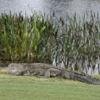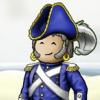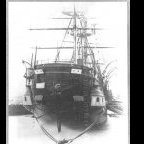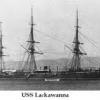Supplies of the Ship Modeler's Handbook are running out. Get your copy NOW before they are gone! Click on photo to order.
×
-
Posts
8,149 -
Joined
-
Last visited
Reputation Activity
-
 allanyed got a reaction from Gabek in 6-pounder, Royal Navy cannon barrel - George III era
allanyed got a reaction from Gabek in 6-pounder, Royal Navy cannon barrel - George III era
Scaling the photo that Ron posted the hole appears to be about 1/2" to 5/8" diameter. If anyone has something more definitive based on contemporary sources I would be grateful to know.
Allan
-
 allanyed got a reaction from mtaylor in 1:98 Wooden Stanchions for HMS Victory
allanyed got a reaction from mtaylor in 1:98 Wooden Stanchions for HMS Victory
I have only seen them in deck drawings but very few show these. Sorry I do not remember where, but from what I recall they were all single stanchions on the center line except where there might be two in the area of a hatch. In that case they were in line with the coamings and often near the corner of the coamings and head ledges. I checked a half dozen contemporary contracts and they all give dimensions of the pilar ends but not location. For a first rate there may have been two under each beam rather than one on the center line. I am curious to see some contemporary information that some member might be able to share.
NOTE: While the center section was often/usually square as mentioned above, keep in mind that this section usually had a heavy chamfer on all four corners.
Allan
-
 allanyed got a reaction from Keith Black in 1:98 Wooden Stanchions for HMS Victory
allanyed got a reaction from Keith Black in 1:98 Wooden Stanchions for HMS Victory
I have only seen them in deck drawings but very few show these. Sorry I do not remember where, but from what I recall they were all single stanchions on the center line except where there might be two in the area of a hatch. In that case they were in line with the coamings and often near the corner of the coamings and head ledges. I checked a half dozen contemporary contracts and they all give dimensions of the pilar ends but not location. For a first rate there may have been two under each beam rather than one on the center line. I am curious to see some contemporary information that some member might be able to share.
NOTE: While the center section was often/usually square as mentioned above, keep in mind that this section usually had a heavy chamfer on all four corners.
Allan
-
 allanyed got a reaction from Darius359au in HMS Victory by Darius359au - Corel - 1:98 - Cross-Section
allanyed got a reaction from Darius359au in HMS Victory by Darius359au - Corel - 1:98 - Cross-Section
Hi Darius359au
I realize it is probably another kit design error, but FWIW for the future or others building this kit, according to the scantlings from David Steel in The Elements and Practice of Naval Architecture 1805, the main wales of first rates circa 1805 were made up of four strakes, not five, and with a total breadth of 5' 2". They were 10" thick. The strake above and the strake below the main wales were 8" thick and subsequent strakes reduced for several strakes ending at 4 1/2" thick for the plank of the bottom. The strakes were likely top and butt or anchor stock rather than straight edge.
The channel wales were made up of 4 strakes up to about 1790 but more likely 3 strakes after that time. Total breath was 3' 0" and the thickness 5 1/2" or 6".
Allan
-
 allanyed got a reaction from Gabek in 6-pounder, Royal Navy cannon barrel - George III era
allanyed got a reaction from Gabek in 6-pounder, Royal Navy cannon barrel - George III era
Take a look at the drawing above that Ron posted, it should help you. We have been working on a similar project where-in we have 3D drawings of Browne (1625), Commonwealth (1650) Borgard (1716) Armstrong Frederick (1760) , and Blomefield (1791) patterns. Still have a ways to go with Armstrong (1725), additional Blomefields, Pitt, Spanish, and French patterns that are only complete in 2D at this time.
The only noticeable difference between the Armstrong and Armstrong Frederick patterns is that there is no trough on the Armstrong pattern and the cypher is for George 2 rather than George 3. Otherwise, the breech, first and second reinforce, and chase along with the astragal rings are virtually the same based on drawings found in Adrian Caruana's The History of English Sea Ordnance volume 2.
Allan
-
 allanyed got a reaction from mtaylor in 1:98 Wooden Stanchions for HMS Victory
allanyed got a reaction from mtaylor in 1:98 Wooden Stanchions for HMS Victory
Hello TJ
According to contemporary information in David Steel's 1805 Elements and Practice of Naval Architecture, the pillars in the hold were not round at that period of time.
Pillars under the orlop beams and gun deck -
13" square along the middle 3/4 of the overall length
At the lower 1/8 of the length they are 16" fore and aft, and 14" athwartships
At the upper 1/8 of the length they are 14" fore and aft and 13" athwartships.
Under the middle gun deck beams, one per beam, 8 inches square at the top and 9 inches square at the bottom.
Under the upper deck 6 inches square at the top and 7 inches square at the bottom except for 2 1/4" square iron pillars at the capstans and galley.
As normal, anything found on Victory today should be checked against contemporary information for the time period the model represents. Many of the details today are different than what she actually looked like at various times of her existence. In the end, your choice. Personally I think the rounded pillars have more character but they may not be realistic if accuracy is a criterion.
.
Allan
-
 allanyed got a reaction from mtaylor in 1:98 Wooden Stanchions for HMS Victory
allanyed got a reaction from mtaylor in 1:98 Wooden Stanchions for HMS Victory
There are way to make these yourself that will yield nice results. If you do not have an electric drill or lathe, you can make them with separate pieces, square stock and dowel. Drill holes in the square ends to the diameter of the cylindrical piece and assemble. You can also glue flats at the ends onto dowels of the proper diameter then sanding and filling with saw dust will yield nice results as well. Finding these already made to the dimensions you want is unlikely. Perhaps some member here with a lathe will make them for you if you provide a detailed dimensioned drawing.
Allan
-
 allanyed got a reaction from mtaylor in Iron Braces on Hanging Knee Deck Supports... HMS Victory
allanyed got a reaction from mtaylor in Iron Braces on Hanging Knee Deck Supports... HMS Victory
Hi Gary
The best I can ascertain from the Steel scantlings is the first picture below and since I cannot find the dimensions of the upper most riders I am pretty sure I got this wrong. Can you correct this for me? I am wondering if the lower paired riders are both considered floor riders in which perhaps the second drawing would be correct. Or, is it possible the first drawing is correctly labeled and Steel does not include what might have been called top timber riders.
Thank you very much.😀
Allan
-

-
 allanyed got a reaction from mtaylor in 6-pounder, Royal Navy cannon barrel - George III era
allanyed got a reaction from mtaylor in 6-pounder, Royal Navy cannon barrel - George III era
Take a look at the drawing above that Ron posted, it should help you. We have been working on a similar project where-in we have 3D drawings of Browne (1625), Commonwealth (1650) Borgard (1716) Armstrong Frederick (1760) , and Blomefield (1791) patterns. Still have a ways to go with Armstrong (1725), additional Blomefields, Pitt, Spanish, and French patterns that are only complete in 2D at this time.
The only noticeable difference between the Armstrong and Armstrong Frederick patterns is that there is no trough on the Armstrong pattern and the cypher is for George 2 rather than George 3. Otherwise, the breech, first and second reinforce, and chase along with the astragal rings are virtually the same based on drawings found in Adrian Caruana's The History of English Sea Ordnance volume 2.
Allan
-

-
 allanyed got a reaction from mtaylor in Hello from West Virginia
allanyed got a reaction from mtaylor in Hello from West Virginia
George
It has been many years so I have no recollection of which skipjack. I do remember there was a great program at that time where they had inner city kids working in the yard and consequently learning trades while earning some money.
Allan
-
 allanyed got a reaction from mtaylor in Hello from West Virginia
allanyed got a reaction from mtaylor in Hello from West Virginia
Super warm welcome aboard George.
I also love the skipjacks, and built a couple models based on information found at the St. Michaels boat yard and Steve Rogers' book The Skipjack. I was lucky when I last visited the yard as they were rebuilding a skipjack and gave me a piece of the original keel which I cut up and used for some of the parts on the last model.
Hope to see more photos. What you show lucks great!!!
Allan
-
 allanyed got a reaction from tmj in 1:98 Wooden Stanchions for HMS Victory
allanyed got a reaction from tmj in 1:98 Wooden Stanchions for HMS Victory
Hello TJ
According to contemporary information in David Steel's 1805 Elements and Practice of Naval Architecture, the pillars in the hold were not round at that period of time.
Pillars under the orlop beams and gun deck -
13" square along the middle 3/4 of the overall length
At the lower 1/8 of the length they are 16" fore and aft, and 14" athwartships
At the upper 1/8 of the length they are 14" fore and aft and 13" athwartships.
Under the middle gun deck beams, one per beam, 8 inches square at the top and 9 inches square at the bottom.
Under the upper deck 6 inches square at the top and 7 inches square at the bottom except for 2 1/4" square iron pillars at the capstans and galley.
As normal, anything found on Victory today should be checked against contemporary information for the time period the model represents. Many of the details today are different than what she actually looked like at various times of her existence. In the end, your choice. Personally I think the rounded pillars have more character but they may not be realistic if accuracy is a criterion.
.
Allan
-
 allanyed got a reaction from Keith Black in Hello from West Virginia
allanyed got a reaction from Keith Black in Hello from West Virginia
George
It has been many years so I have no recollection of which skipjack. I do remember there was a great program at that time where they had inner city kids working in the yard and consequently learning trades while earning some money.
Allan
-
 allanyed got a reaction from Canute in Size of a printer needed
allanyed got a reaction from Canute in Size of a printer needed
No matter the printer, draw a test piece with a rectangle that is 5"X 6" or some such dimensions that can be measured with a caliper or other accurate device. Then print it and measure to see if it is accurate. Not all printers are created equal. I always take a caliper to a print shop when I need larger prints. Retail print shops like the old Kinkos rarely got it right the first time but were able to make adjustments. Architectural firms are a better way to go if you cannot get accurate prints at home.
Allan
-
 allanyed got a reaction from ExiledArtist in Hello from West Virginia
allanyed got a reaction from ExiledArtist in Hello from West Virginia
George
It has been many years so I have no recollection of which skipjack. I do remember there was a great program at that time where they had inner city kids working in the yard and consequently learning trades while earning some money.
Allan
-
 allanyed got a reaction from Canute in Iron Braces on Hanging Knee Deck Supports... HMS Victory
allanyed got a reaction from Canute in Iron Braces on Hanging Knee Deck Supports... HMS Victory
Hi Morgan
Could you post this as a new subject in the Ship's Plans and Project research forum as I believe a lot of member would like to follow this and may not see it here in TMJs "iron braces" topic.
Thanks
Allan
-
 allanyed got a reaction from Dlowder in HMS Victory by Darius359au - Corel - 1:98 - Cross-Section
allanyed got a reaction from Dlowder in HMS Victory by Darius359au - Corel - 1:98 - Cross-Section
Hi Darius359au
I realize it is probably another kit design error, but FWIW for the future or others building this kit, according to the scantlings from David Steel in The Elements and Practice of Naval Architecture 1805, the main wales of first rates circa 1805 were made up of four strakes, not five, and with a total breadth of 5' 2". They were 10" thick. The strake above and the strake below the main wales were 8" thick and subsequent strakes reduced for several strakes ending at 4 1/2" thick for the plank of the bottom. The strakes were likely top and butt or anchor stock rather than straight edge.
The channel wales were made up of 4 strakes up to about 1790 but more likely 3 strakes after that time. Total breath was 3' 0" and the thickness 5 1/2" or 6".
Allan
-
 allanyed got a reaction from Keith Black in Hello from West Virginia
allanyed got a reaction from Keith Black in Hello from West Virginia
Super warm welcome aboard George.
I also love the skipjacks, and built a couple models based on information found at the St. Michaels boat yard and Steve Rogers' book The Skipjack. I was lucky when I last visited the yard as they were rebuilding a skipjack and gave me a piece of the original keel which I cut up and used for some of the parts on the last model.
Hope to see more photos. What you show lucks great!!!
Allan
-
 allanyed got a reaction from ExiledArtist in Hello from West Virginia
allanyed got a reaction from ExiledArtist in Hello from West Virginia
Super warm welcome aboard George.
I also love the skipjacks, and built a couple models based on information found at the St. Michaels boat yard and Steve Rogers' book The Skipjack. I was lucky when I last visited the yard as they were rebuilding a skipjack and gave me a piece of the original keel which I cut up and used for some of the parts on the last model.
Hope to see more photos. What you show lucks great!!!
Allan
-
 allanyed reacted to Blue Ensign in HMS Indefatigable 1794 by Blue Ensign - FINISHED - Vanguard Models - 1:64 scale
allanyed reacted to Blue Ensign in HMS Indefatigable 1794 by Blue Ensign - FINISHED - Vanguard Models - 1:64 scale
Post Seventy-nine
Foc’sle (Part 2)
2073
The Foc’sle beams are fixed into place.
2074
Temporary props are used to support the breast beam whilst the carlings set.
2070
2067
The foremost beam of the Foc’sle deck is an mdf version, originally designed to incorporate the Bowsprit step.
To match the other beams, the top was faced with 0.6mm pear.
With the beams now fixed I move onto the Hanging and lodging knees.
This is a prep intensive exercise with char removal, painting, and fettlin’ to fit.
Those opting to fully deck the model need have little concern for such detail, as it will all be covered, but I would probably have done them anyway, given that Chris has taken the trouble to provide them.
B.E.
17/09/2023
-
 allanyed reacted to oakheart in HM Cutter Speedy 1828 by oakheart - from plans drawn by Bill Shoulders in 1972
allanyed reacted to oakheart in HM Cutter Speedy 1828 by oakheart - from plans drawn by Bill Shoulders in 1972
So here I am back, it's been a long summer, so much to do.................
Managed to get a bit done on the Speedy. Garboard plank in place on both sides.
while I am plodding away building this 1:48 scale model some people build full size Cutters. Here is the real thing
Luke Powell built the 'Pellew'
https://www.workingsail.co.uk/pellew?itemId=fihssy98q3833wr2jbjrsb17q7mzt6
loads of videos of it on youtube.
and some action video of other Cutters , really shows what it must have been like sailing these craft.
anyway, the sun is shining and I have more garden work to do.
See you soon
Tim
-
 allanyed reacted to Gregory in HMS Greyhound by Srenner - Corel - 1:100
allanyed reacted to Gregory in HMS Greyhound by Srenner - Corel - 1:100
Round Abrasive Cord
The linked item is ~.457mm They have a variety of sizes.
-
 allanyed reacted to Outfielder in Hello
allanyed reacted to Outfielder in Hello
My best gay friend and I are always on the lookout for new and exciting gay porn titles to add to our gay porn collection and share with each other.
https://gayporn.name/models/myles-landon/
https://freegayporn.club/sites/ohmybutt/
https://gaypornwebsite.com/tags/gay-teen-18/









